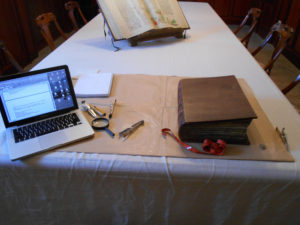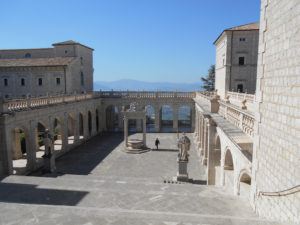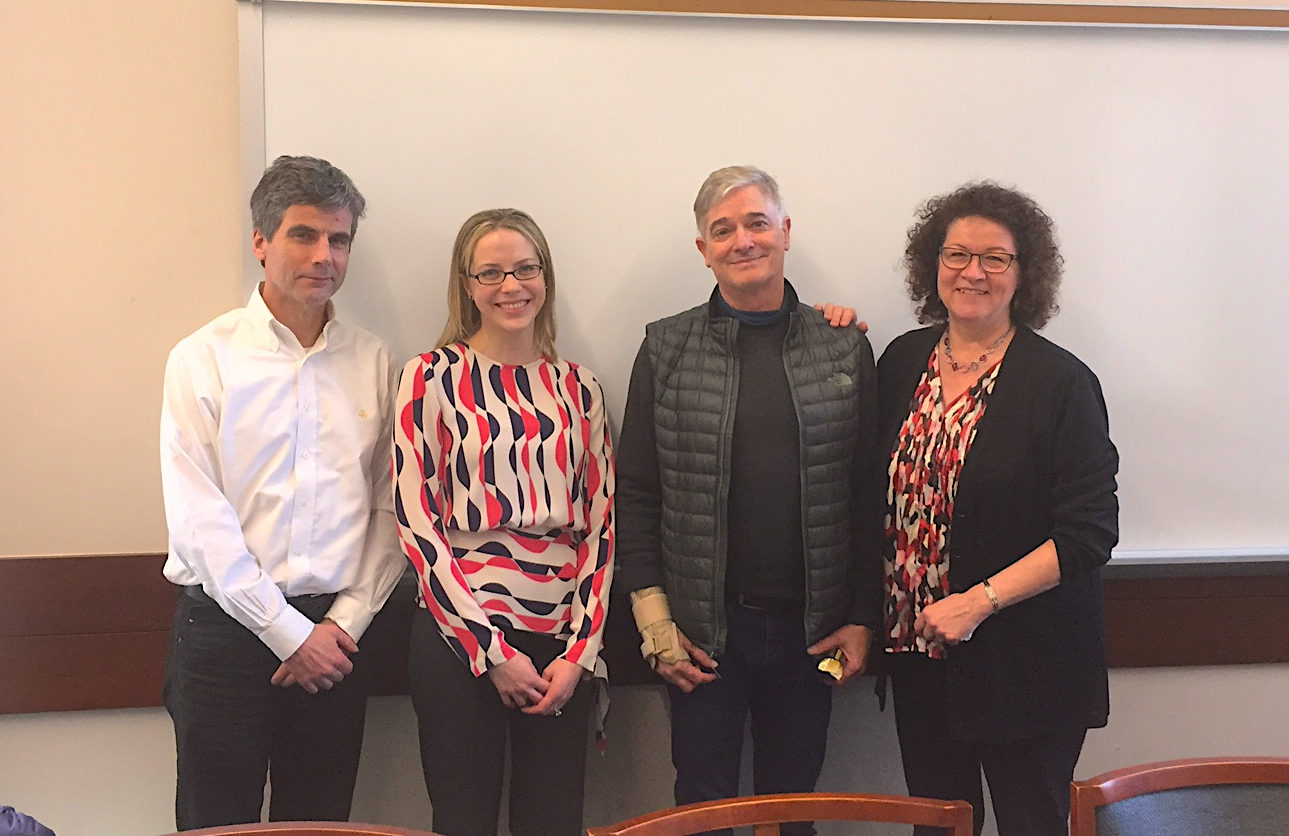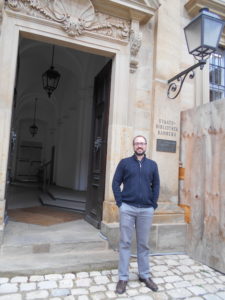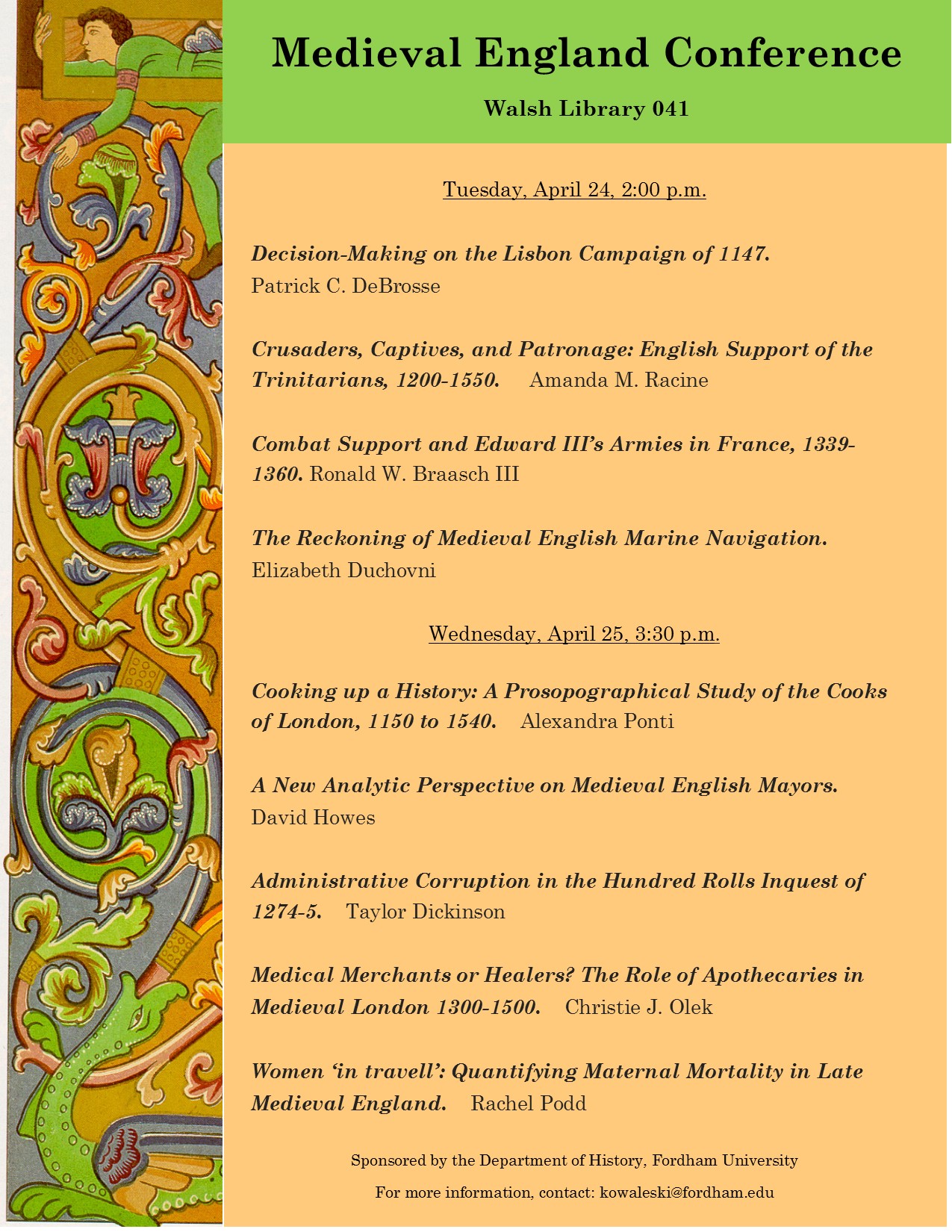
Tag Archives: History of Medicine
Medieval England Conference at Fordham!
Comments Off on Medieval England Conference at Fordham!
Filed under Department Events, Events, Grad Student News, This week in Fordham History
Postcard from the Archives: Jeffrey Doolittle
We received a postcard from PhD student Jeffrey Doolittle updating us on his year as a Fordham University GSAS Research Fellow:
Throughout this past spring, I have been happily ensconced in Italy conducting research for my dissertation. I am currently exploring the medical culture of the Benedictine abbey of Montecassino in the ninth-century through a study of one of its products, Archivio dell’Abbazia, Codex 69, a project that requires an extensive codicological and paleographical analysis of a small corpus of manuscripts written in the Beneventan script. Thanks to a GSAS Research Fellowship, I was able to visit a number of archives in Northern Europe last fall; this spring and summer, I spent most of my time in Cassino researching at the Archivio dell’Abbazia of Montecassino under the patient guidance of the archivist, Don Mariano Dell’Omo. St. Benedict’s famous monastery, of course, is located at the top of a mountain, and the archive is also only open in the morning when buses do not run. So I woke up especially early and hiked up every day, a trip that ordinarily took about 1.5 hours. Fortunately, and in the spirit of Benedictine moderation, I did not have to walk both ways; there was a bus to come back down.
When not at the Archive, I was able to make use of the resources of the “Laboratorio per lo studio del libro antico” at Università degli Studi di Cassino e del Lazio Meridionale and its incredible digital library of medieval manuscripts, and I remain especially thankful for the expertise and kind assistance of the curators of the laboratory, Drs. Lidia Buono, Eugenia Russo and Stella Migliorino. Using Cassino as a base, I have also been able to visit the Biblioteca Medicea Laurenziana (Florence), the Biblioteca Casanatense (Rome), the Biblioteca Apostolica Vaticana (Vatican City) and the Biblioteca Nazionale in Naples.
Since July 1, I have moved on to the United Kingdom where I will deliver a paper at the International Medieval Congress at Leeds. I will also visit a few additional archives in the UK and Ireland including the Hunter Library in Glasgow, before returning home by the end of July.
Thanks for the postcard, Jeff. We look forward to seeing you when you’re back and hearing more about your research and archival discoveries.
Comments Off on Postcard from the Archives: Jeffrey Doolittle
Filed under Grad Student News, Postcards
Congratulations to Kristin Uscinski!
This past week Kristin Uscinski successfully defended her dissertation, entitled “Recipes for Women’s Healthcare in Medieval England”. Kristin’s mentor was Professor Maryanne Kowaleski, her readers were Professors Wolfgang Mueller and David Myers and Examiners were Professors Claire Gherini and Nicholas Paul.
In addition to defending, Kristin’s research also got a great write-up in Fordham News– go check it out!
Comments Off on Congratulations to Kristin Uscinski!
Filed under Doctoral Defenses, Grad Student News
Six Weeks, Four Countries, Five Libraries: The Research Adventures of Jeffrey Doolittle
With funding provided by a GSAS Research Fellowship, graduate student Jeffrey Doolittle has been able to spend six and a half weeks this autumn at five research libraries in Europe working with several Beneventan manuscripts that will be integral to his dissertation.
Jeffrey’s project explores the medical monastic culture of the early medieval Benedictine abbey of Montecassino through a study of one of its products, Archivio dell’Abbazia, cod. 69, a compendious manuscript produced in the late ninth century. Part of his project entails an extensive codicological and paleographical analysis of Montecassino 69 in comparison with other early medieval manuscripts written in the Beneventan script. So, in order to collect the data for this portion of his dissertation, Jeffrey has traveled to study manuscripts in the collections of the Universiteitsbibliotheek Leiden (the Netherlands), Det Kongelige Bibliotek (Copenhagen, Denmark), and the Staatsbibliothek Bamberg (Bamberg, Germany). And over the next few weeks, he will make two more stops at the Bayerische Staatsbibliothek in Munich and finally the Österreichische Nationalbibliothek in Vienna, all before the holiday break! Through the course of this journey, he will study a total of eleven manuscripts. So far, the trip has been extraordinarily productive and rewarding, and Jeffrey has enjoyed conversations with the wonderfully friendly librarians and specialists, including Erik Petersen in Copenhagen and Stefan Knoch in Bamberg. Still, he looks forward to returning home to his family for the holidays, and preparing for another research trip to Italy in the spring!
Comments Off on Six Weeks, Four Countries, Five Libraries: The Research Adventures of Jeffrey Doolittle
Filed under Grad Student News, Postcards
Meet the Winners of the Loomie Prize for 2015
Each year the History department awards its highest honor for excellence in graduate scholarship, the Loomie Prize. The Loomie prize is awarded to the best seminar paper produced during the previous academic year. All M.A. and Ph.D. students who have taken the proseminar/seminar sequence or a research tutorial are eligible. The prize for 2015 was awarded to Rachel Podd and Christine Kelly.
Rachel Podd‘s paper “Interrogating the Guaridoras: Women, Medicine and Magic in Catalonia before the Plague” was written under supervision of Alex Novikoff. The Loomie judges noted that it was based on rich source material, and offered a convincing argument about why and how these sources could be useful to scholars beyond those who specialize in 14th century Catalonia. Rachel wrote that “these documents offer a window… into a vibrant and dynamic world. Within them, one may find Saracens and Christians, men and women, as well as spells and incantations for the health of people and of animals. Through close reading and contextualization, they can elucidate the lives of individuals performing curative activities outside of the major civic centers of Catalonia before the arrival of the plague – what types of diseases did they treat, and how? If caught, what punishment could they expect from the ecclesiastical judicial structure?” Hence, Rachel demonstrated how these records sit at the juncture of vernacular medicine, episcopal control, and inquisition.
Christine Kelly‘s paper “Gender, the Popular Front, and the Folksong Revival through Sing Out! Magazine, 1950 – 1968″ written under supervision of Kirsten Swinth. Her essay is an outstanding example of cultural analysis built from the gritty work of data collecting. By categorizing hundreds of articles in the folk music periodical, Sing Out!, Christine developed a highly original thesis about the discourse of gender in the 1960s folk music revival. She overturned a conventional division between the leftist cultural movements of the 1930s, and those of the 1960s, showing that folk revivalists in the 1960s resurrected familiar tropes and narratives of gender from the 1930s. These were ultimately highly traditionalist, premising an anti-capitalist utopia on an idealized view of the American past where women remained tied to “traditional domestic and reproductive spaces” and “men were more responsible for carrying out the daily operations of political thought and cultural innovation that constituted the engine [of the] folk song revival.”
We reached out to Rachel and Christine for details about their work and how they developed the ideas and research for their papers.
Comments Off on Meet the Winners of the Loomie Prize for 2015
Filed under Grad Student News, Student Awards
“Footnoting History” Ranked In Top Ten Podcasts
Footnoting History, your band of merry podcasters comprised of many alums and current graduate students of Fordham’s history department, are pleased to announce that one of our recent episodes has been singled out by the Canadian Broadcasting Corporation’s CBC Radio as a history podcast “you need to hear”!
In “The Royal Teeth of Louis XIV,” Christine explains how King Louis XIV of France may be known as the “Sun King” but not everything about his life was bright and splendid. In this episode she discusses the crippling dental difficulties that plagued Louis and possibly increase your appreciation of modern anesthesia.
If you haven’t already done so, please consider subscribing on iTunes, liking us on facebook, and following us on Twitter!
Comments Off on “Footnoting History” Ranked In Top Ten Podcasts
Filed under Alumni News, Grad Student News, Publications
In New Article, Durba Mitra Explores Medical Jurisprudence and Rape Adjudication in India
We undertook a comprehensive study of the role of forensic medicine in the legal adjudication of rape cases in postcolonial India. We studied all publications on medical jurisprudence for India from the late nineteenth century until today in South Asia and analyzed the use of medical jurisprudence in rape cases reported in the high courts in India from 1952 until 2011. Rape has received significant attention in the last two years in international media, leading to the substantial reform of rape laws in India. We argue that for legal reforms to be effective, changes must be made to textbooks, medical protocol, and the use of medical evidence in rape cases. Our research resulted in the publication of our article, “Testing Chastity, Evidencing Rape:” in Economic and Political Weekly, a key peer-reviewed publication on India that brings together academics, researchers, and policy makers.
Comments Off on In New Article, Durba Mitra Explores Medical Jurisprudence and Rape Adjudication in India
Filed under Faculty News, Publications
Critiquing a Memorial to a Medical Legacy, in Central Park
 Professor Durba Mitra‘s graduate class, Gender and History, had a discussion about gender and sexuality in the landscape of New York City next to the statue of J. Marion Sims, the so-called “Father of Gynecology” in Harlem. From 1845-1949, Sims carried out experimental surgeries on slave women to address the issue of persistent fistula after protracted labor in childbirth. He conducted these procedures on slave women without the use of anesthetics, believing that slave women did not need anesthesia for pain relief. While he is memorialized in a statue at 103rd Street and 5th Avenue for his innovative surgical techniques and his contribution to NYC medical institutions, his commitment to slavery and his use of slave women for experimentation is less well known. The memorial bears no marks of this history.
Professor Durba Mitra‘s graduate class, Gender and History, had a discussion about gender and sexuality in the landscape of New York City next to the statue of J. Marion Sims, the so-called “Father of Gynecology” in Harlem. From 1845-1949, Sims carried out experimental surgeries on slave women to address the issue of persistent fistula after protracted labor in childbirth. He conducted these procedures on slave women without the use of anesthetics, believing that slave women did not need anesthesia for pain relief. While he is memorialized in a statue at 103rd Street and 5th Avenue for his innovative surgical techniques and his contribution to NYC medical institutions, his commitment to slavery and his use of slave women for experimentation is less well known. The memorial bears no marks of this history.
Continue reading
Comments Off on Critiquing a Memorial to a Medical Legacy, in Central Park
Filed under Faculty News, New Course, Teaching
Inaugural HGSA Research Seminar: Lucy Barnhouse, Sept 25
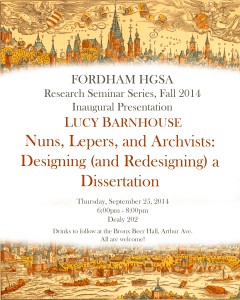 Thursday, September 25 the History Graduate Student Association (HGSA) will launch their new Research Seminar with a presentation by PhD candidate Lucy Barnhouse entitled “Nuns, Lepers and Archivists: Designing (and Redesigning) a Dissertation”. The presentation will be held at 6 pm in Dealy 202. Read on for details of the talk and the new seminar series.
Thursday, September 25 the History Graduate Student Association (HGSA) will launch their new Research Seminar with a presentation by PhD candidate Lucy Barnhouse entitled “Nuns, Lepers and Archivists: Designing (and Redesigning) a Dissertation”. The presentation will be held at 6 pm in Dealy 202. Read on for details of the talk and the new seminar series.
Comments Off on Inaugural HGSA Research Seminar: Lucy Barnhouse, Sept 25
Filed under Department Events, Grad Student News

